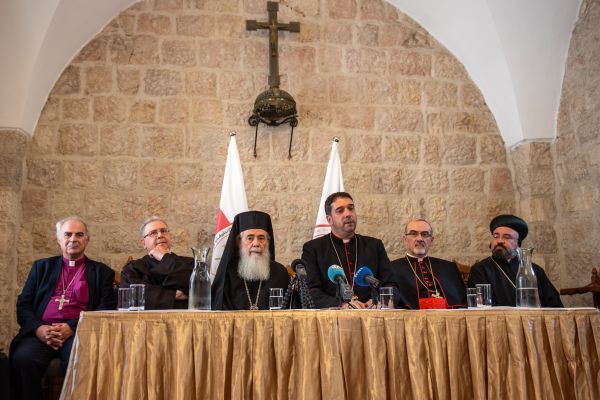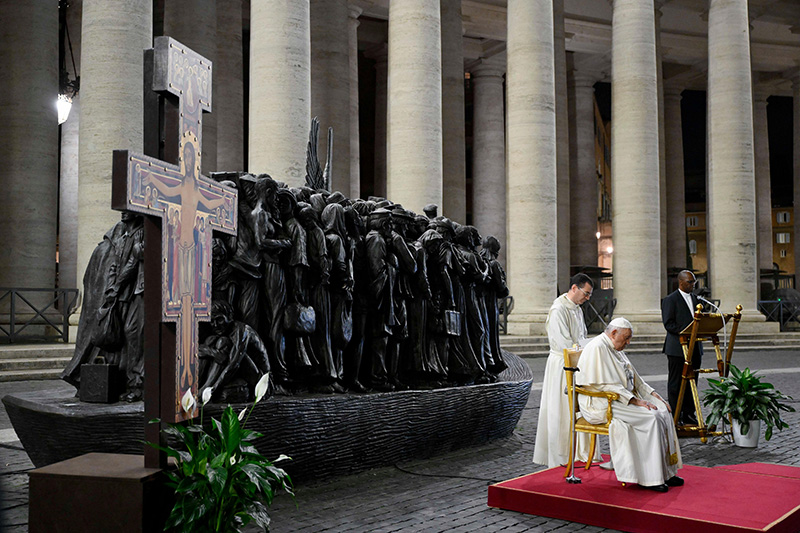Synod tensions have been rising, but the process has so far been able to contain them. In the hall, the discussion has covered hot-button topics, including the church’s welcome of LGBTQ Catholics and the role of women.
Some interventions at the synod have questioned whether the Church needs to change its approach to LGBTQ people. Others gave powerful testimonies about why change is necessary.
Fr Timothy Radcliffe, the English Dominican friar acting as a spiritual adviser to the synod, referred to a story told to the synod hall of a woman who took her own life “because she was bisexual and did not feel welcomed”.
The Tablet understands that this intervention made a powerful impact on the gathering and involved a Polish woman who, according to the testimony, had been refused absolution after going to confession.
“Many of us wept,” Fr Timothy said when referring to this story. “I hope it changed us.”
A crucial question for synod participants concerns how to welcome LGBTQ people while maintaining church teachings on marriage and sexuality. Latvian Archbishop Zbignev Stankevics, for example, pointed out the demands for chastity but also spoke about his “pastoral conversion” on the topic, inspired by Pope Francis.
The Pope made his intervention into the discussion by receiving Sr Jeannine Gramick, the co-founder of New Ways Ministry, a group which ministers to gay Catholics, during the synod. It was a remarkable meeting given Sr Jeannine and her late co-founder, Fr Robert Nugent, and both been censured by the Vatican for their work.
There is a growing sense in Rome that the synod must lead to concrete reforms. Francis, in an interview with the Argentinian news outlet Télam, released halfway through the synod, said: “Since the Second Vatican Council, John XXIII had a very clear perception: the Church has to change. Paul VI agreed, just like the succeeding Popes.”
As the synod discussion moved onto the meaty topic of “participation, governance and authority”, Cardinal Jean-Claude Hollerich, the synod coordinator, said the “people closest to us” are “wondering what will change for them.” He urged the small group to come up with “concrete proposals” and warned that clericalism – where an elite holds authority – stifles the Church’s mission.
The synod is looking at the relationship between the ordained priesthood and the ministry that every Church member carries out through baptism. A critical task for the Church remains the liberation of the priesthood from clericalism and ensuring all Catholics have a sense of responsibility for the Church’s work.
Throughout the synod process, the role of women in the Church has consistently been identified as an urgent priority. The discussions have included the question of admitting women to the diaconate, a topic repeatedly raised by the synod process at the local and continental levels. Some have said this question – the subject of two papal commissions during the Francis pontificate — is not prominent, and the question of female participation in the church goes broader than roles and functions. Nevertheless, it is not likely to go away.
Some changes better to include women in decision-making can be brought in immediately, for example, in pastoral councils (forums that seek to involve lay people in decision-making at a diocesan level). Myriam Wijlens, one of the synod advisers, has pointed out that there is nothing to stop a bishop from mandating that 50 per cent of his pastoral council should be women.
Meanwhile, French Bishop Alexandre Joly told synodal delegates how he tackled a financial crisis in his diocese by bringing “together a group of Christians with different skills, under the leadership of a woman”.
Bishop Shane Mackinlay spoke of Australia’s synod process (the Plenary Council) and how it dealt with disagreement over the role of women in the church. As I reported for The Tablet from Sydney, the bishop played a crucial role in overcoming difficulties in that process.
The interventions of Mackinlay, 58, and Joly, 52, show that the emerging leaders of the church are likely to be those willing to put synodality into action and to exercise their episcopal ministry that enables participation rather than relies on the old ways of command and control.
Despite the disagreements, the synod is holding. There have been striking images of delegates holding very different viewpoints talking to each other. Fr James Martin, known for his ministry to gay Catholics, was pictured with Cardinal Gerhard Müller, the former Vatican doctrine prefect who has described blessing same-sex couples as “blasphemy”. They exchanged gifts: Cardinal Müller gave Fr Martin a book on Gustavo Gutiérrez, the father of liberation theology, and the American Jesuit gave the German cardinal a copy of his book on Jesus.
The new synod, however, will take time to get used to. At least one prelate has stormed out of the hall. Although two Chinese bishops have left the Synod due to “pastoral needs” in their dioceses, no one has stormed out and not come back. The differences don’t have to be debilitating, and it is through the “constellation of divergences” that something new can emerge.
A strong opposition to the synod remains. At a media briefing on 19 October, Bishop Daniel Flores of Brownsville, Texas, was asked about the “conspiracy” theory being floated that “the bishops are being manipulated by a liberal cabal”.
He replied: “I do not see a conspiracy. I have simply heard honest, sincere, faithful, charitable conversations under the care of Peter [the Pope]. That is not a threat to the faith.”
The final part of the synod assembly will see participants discuss and agree on a document synthesising their discussions, and this will then be sent to local churches for further discernment. Areas for further reflection and study are also likely to be identified.
Fr Vimal Tirimanna from Sri Lanka, a theological adviser to the process, told journalists that the contested topics raised by the synod can only be addressed “once the firm foundation of the synodal way of life is laid”. But the synodal builders have begun their work.



 Loading ...
Loading ...